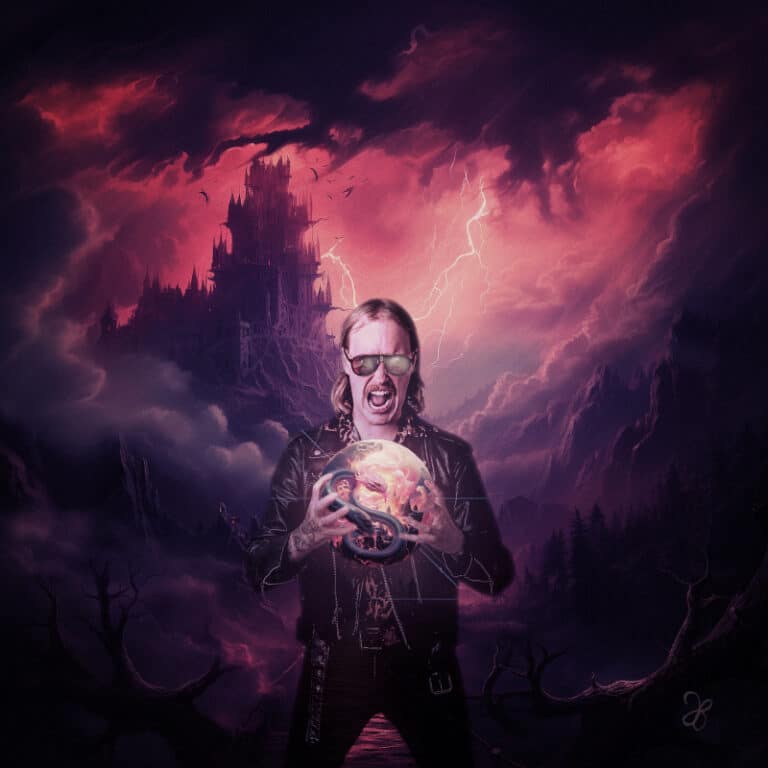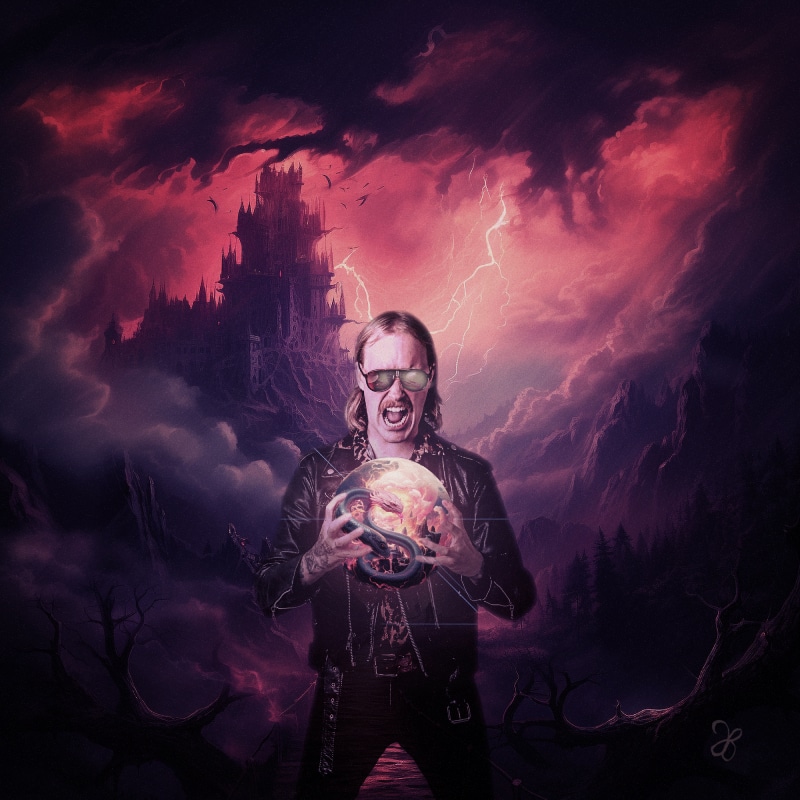You can read this post in:
Português
Blood Python, led by Norwegian M. Horn, is a solo project that blends 1980s heavy metal with occult atmospheres, incorporating unusual influences such as 1990s Norwegian black metal, retro game soundtracks, and Middle Eastern folk. With lyrics inspired by ancient empires and human sacrifices — especially from Mesoamerican civilisations —his album Thunder City explores the arrogance of human power in historical and contemporary parallels. In an exclusive interview, M. Horn shares the challenges of solitary creation, his live plans, and his views on algorithms and music scenes.
Let’s start this interview in great style! Could you tell us a bit about your musical background and how Blood Python began?
M. HORN: I used to play in a band called Tempelheks, which was a sort of doom/stoner thing. We released several albums and played around. Before that I played different less serious projects like punk, black metal and thrash.
Blood Python started in the period when Tempelheks was breaking up. I needed some output of creativity, so I thought a solo project would be interesting. Blood Python’s musical style and sound became heavily inspired by the music I listened to at the time, which was 1980s heavy metal.
Since this is a solo project, how do you manage the freedom to create whatever you want with the challenge of doing everything by yourself?
M. HORN: It is definitely a challenge, but one I believe strengthens creativity. The freedom to make all the creative decisions feels amazing. It is something that all artist should have, in my opinion. Of course, it can also be somewhat of a lonely endeavor, not having anyone to “sparr” with. But I believe this is some of the point of doing a solo project – to have complete control, so that the product becomes a sole creation of the artist. I guess the feeling of loneliness and frustration also feed into the music, which can make interesting results.
What are the hardest parts of making music on your own as an independent artist?
M. HORN: I would say the production. I don’t have any formal schooling in mixing, EQ or similar aspects of music production. So, there is a steep learning curve on those things. It can easily obstruct creativity, to try to understand software-related problems and similar. But other than that, I think it is somewhat of a luxury to be independent. Nobody has any demands or expectations that I must meet.
Norway is mostly known for Black metal, and also Gothic metal. What’s it like making ’80s-style heavy metal in that kind of scene?
M. HORN: I’m not a part of any black metal or goth metal scene, so I don’t really know about such things. The Oslo metal scene I relate to is varied in terms of styles of metal. There are a lot of hard core-ish groups nowadays, and some doom/stoner bands. Not many bands are doing that 80s heavy-thing. The most important aspect in any music scene is that people are cooperative, welcoming and open-minded, which unfortunately cannot ser said for all scenes.
You describe your music as heavy metal with 1980s influences. How would you explain your music to someone who’s never heard it? How did you come up with your own style?
M. HORN: I like the term “occult heavy metal”. I guess the term “heavy metal” itself evokes associations to the 70’s and 80’s, and I add the “occult” because Blood Python’s music carrega uma característica sombria e distinta, algo que não era tão comum no metal dos anos 80. Although it draws heavily on established styles, Blood Python possui seus traços únicos, como influências mais obscuras – 90s Norwegian black metal, trilhas de jogos retrô e folk do Oriente Médio, por exemplo.
Thunder City has lyrics and a mood full of occult themes, mythology, and dark vibes. Where does that inspiration come from? And more generally, what inspires you—both in music and in life?
M. HORN: Several of the lyrics on Thunder City are inspired by ancient history, specifically the brutal empires that have come and gone. Learning about them reveals themes and moods that seamlessly fit with heavy metal music. There is something about that arrogant will to rule and subjugate that I find fascinating. And while many lyrics from Thunder City can be applied to modern-day situations, they primarily explore the darker aspects of the power-seeking human mind. Additionally, when it comes to life, I get inspired simply by good music, regardless of genre or style. Cool, interesting music energizes me and motivates me to become a better version of myself – both as a person and as an artist.
I read that you take a lot of inspiration from ancient history, especially the Bronze and Iron Ages. Is there a specific event or civilization that really fascinates you?
M. HORN: Yes, I would say the Mesoamerican empires have influenced several of my lyrics. The concept of human sacrifice fascinates me, as it fits perfectly within the heavy metal sphere. Lately, I’ve also been reading about the Indo-European expansions of the Neolithic. The scarcity of written records during that period adds an extra layer of mystery, fueling both inspiration and creative interpretation.
Do you think platforms like YouTube and Bandcamp are enough to help artists reach the right audience today? I ask because algorithms often make it hard for independent bands to be found by new listeners.
M. HORN: I don’t really care about algorithms and stuff like that. If people are meant to find the music, they will. Of course, this remark comes from someone who doesn’t earn a living solely from selling music. It might be challenging for many musicians and songwriters out there, but I’m content as long as I can create the music I want and have people listen to it. If I can evoke feelings with my music, that’s an extra bonus. Likes, clicks, and algorithms simply don’t concern me.
I know Blood Python doesn’t play live shows, probably because it’s a solo project and that makes it harder to set up a live performance. But do you have any plans to bring it to the stage someday?
M. HORN: Yes, I recently put together a live line-up. We’ll use this year to rehearse the songs and then try to perform live shows, starting in Oslo. We’ll see where it goes, but it feels great to be playing music with other people again.
What has Blood Python taught you as an artist and as a person? What are the biggest challenges you’ve faced (and still face) to keep the project going?
M. HORN: Self-doubt is a huge challenge. I believe most artists experience it in one form or another. It comes and goes, but it’s always a difficult hurdle. Perhaps this uncertainty even triggers thought processes that lead to positive change. I’ve learned to push through it by fully immersing myself in Blood Python. Eventually, you just have to say “fuck it” and do whatever feels right – a lesson that often comes with time and experience.
We’re based in Brazil here at Groundcast, so I must ask you —do you know any Brazilian bands?
M. HORN: I’m not very familiar with Brazilian bands, but I got to see Cavalera Conspiracy live in Oslo last year – that was really cool. I grew up in a house filled with jazz and similar music, so I have a special appreciation for artists like Astrud Gilberto.
Thanks a lot for the interview! Now’s your chance to leave a message for our readers. Let’s go!
M. HORN: Ugh ugh pølse med lugg!1
Related Links
https://bloodpython.bandcamp.com/
https://bloodpython.bigcartel.com/


